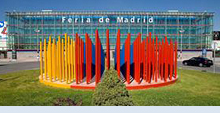 |
European Planetary Science Congress 2012
IFEMA-Feria de Madrid
23 – 28 September 2012, Madrid, Spain |
 |
|
MT2 e-infrastructures and the VO for planetary sciences |
| Convener: Gérard M. Chanteur | Co-Convener: Maria Teresa Capria |
|
Oral Program
/ Wed, 26 Sep, 14:30–18:00
/ Room Mars
Poster Program
/ Attendance Tue, 25 Sep, 18:15–19:45
/ Poster Area
|
Planetary scientists need efficient access to the best and latest available observations, laboratory measurements,theoretical or simulation models encompassing a large number of different fields. The development of e-infrastructures, as defined by the e-Infrastructure Reflection Group in its document "e-IRG Roadmap 2010", allows each scientist having an access to the web to access to all electronically available resources whatever they are: data, software, computing facility, forum of experts ... Main data suppliers like space agencies and research organizations managing the main ground observatories have developed and maintain/extend large data repositories for archiving observations: NASA/PDS and ESA/PSA are well known examples of these long term efforts to offer a permanent access to unique data in order to optimize their use. Meanwhile numerous data bases of interest for planetary sciences do exist over the world with more or less user-friendly interfaces. The efficient data mining of these observational archives, or the efficient search for a given laboratory data or a data processing software requires standards for making data repositories interoperable with protocols for searching, accessing, and retrieving data in a way as easy as possible for the front end user. Virtual Observatories provide users this easy access to public data, data processing tools to analyse, visualize, and possibly combine ressources whatever are their location and archiving format. Theoretical VOs also provide access to simulation tools or to simulation results.
The aim of this session is :
- to present an updated overview of the VO accordingly to the IVOA
- to review the state of the art in interoperability following recommendations by international organizations like IPDA and IVOA,
- to present available data repositories allowing automated search by requests from VOs,
- to present VO projects devoted to, or of interest for planetary sciences,
- to present science cases demonstrating the power of VO tools in planetary sciences.

